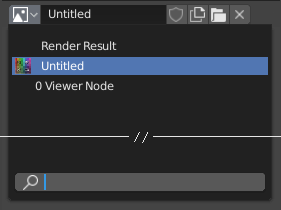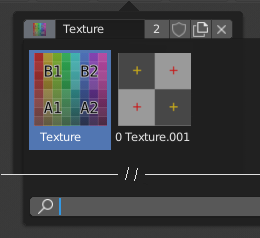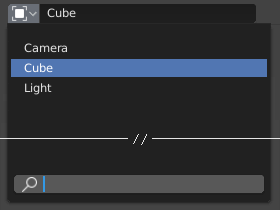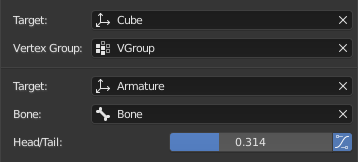Menú Bloque de Datos¶
A set of menu buttons used to link Bloques de Datos to each other. If data-blocks are linked the data will be updated across all of the data users when edited.

Un menú de bloque de datos con un campo de búsqueda.¶
- Tipo
Shows an icon indicating the data-block type. It opens up the following pop-up menu. The data-block can be dragged from here e.g. to drag a material onto an object in the 3D Viewport or into a Identificador de Datos field.
- Lista
Una lista de bloques de datos disponibles en el fichero-blend actual o un enlace para seleccionar un elemento. El menú podría mostrar además una previsualización de los elementos y un campo de búsqueda para localizar el elemento en la lista por nombre.
- Nombre
Displays the internal name of the linked Data-Block, which can be edited as a regular text field. If a name is already assigned, Blender will add a digit to the name like «.001».
- Número de Usuario
Displays the number of data users of the data. Clicking on user count button will make it a single-user copy, with it linked only to the active object/object’s data.
- Usuario Ficticio (icono del escudo)
Keeps the data-block saved in the blend-file, even if it has no Real User. When activated an «F» will be shown before the name in the list.
- Make Local (chain icon)
Todo <2.79.
- Nuevo/Añadir (icono de ficheros)
Creates a new data-block or duplicates the current data-block and applies it.
- Abrir Fichero (icono de carpeta)
Opens the File Browser.
- Desempacar Fichero (icono de papelera)
Unpack the file packed into the current blend-file to external ones.
- Desvincular Bloque de Datos
X Borra el enlace. Mayús-LMB para configurar los usuarios a cero, lo que permite que los datos se eliminen por completo del archivo-blend.
En ocasiones hay una lista de bloques de datos aplicados (como una lista de materiales usados en el objeto).
Ver también
Los bloques de datos se analizan con más detalle en el capítulo de Datos del Sistema.
Previsualización¶

The Data-Block menu with preview.¶
In the Tool Settings is a version of the data-block menu with a bigger preview.
Identificador de Datos¶

Un campo Identificador de Datos.¶
A Data ID is a text field with an icon on the left, which opens a pop-up. Data ID is a unique name for an object. Data ID is used to refer to objects, and therefore Blender does not allow any two objects of same type to have same ID (same name). If Data ID is already in use, Blender will automatically append a number to the end to prevent ID collision (for example «Cube.001»).
Menus showing Data IDs can show the following elements:
- Tipo
El icono a la izquierda especifica el tipo de bloque de datos aceptado.
- Nombre
The text field functions as a search field by matching elements in the list. Press Tab to auto-complete names up to the level a match is found. If more than one match exists, you have to continue typing. If you type an invalid name, the value will remain unchanged.
- Lista
Le permite seleccionar directamente el bloque de datos.
- Cuentagotas
En algunos Identificadores de Datos hay un Cuentagotas disponible a través del icono de la pipeta en el lado derecho.
- Eliminar
X Click the
Xbutton on the right to remove the reference.
Sub Identificadores¶
Tipos de Identificadores relacionados pueden estar disponibles para seleccionar una propiedad o un objeto secundario, según el tipo de objeto.

Ejemplo de Sub Identificador.¶
- Grupo de Vértices
If the selected object in the Name field is a mesh or a lattice, an additional field is displayed where a vertex group can be selected.
- Hueso
If the selected object in the Name field is an armature, a new field is displayed offering the choice to specify an individual bone by entering its name in the Bone data ID.
- Cabeza/Cola
If a Bone is set, a new field is displayed offering the choice of whether the head or tail of a Bone will be pointed at. The slider defines where along this bone the point lies interpolating along the bone axis in a straight line. A value of zero will point at the Head/Root of a Bone, while a value of one will point at the Tail/Tip of a Bone.
- Uso de la Forma de un Hueso Flexible (B-Bone)
When the bone is a bendy bone, click on this button to make the point follow the curvature of the B-spline between head and tail.